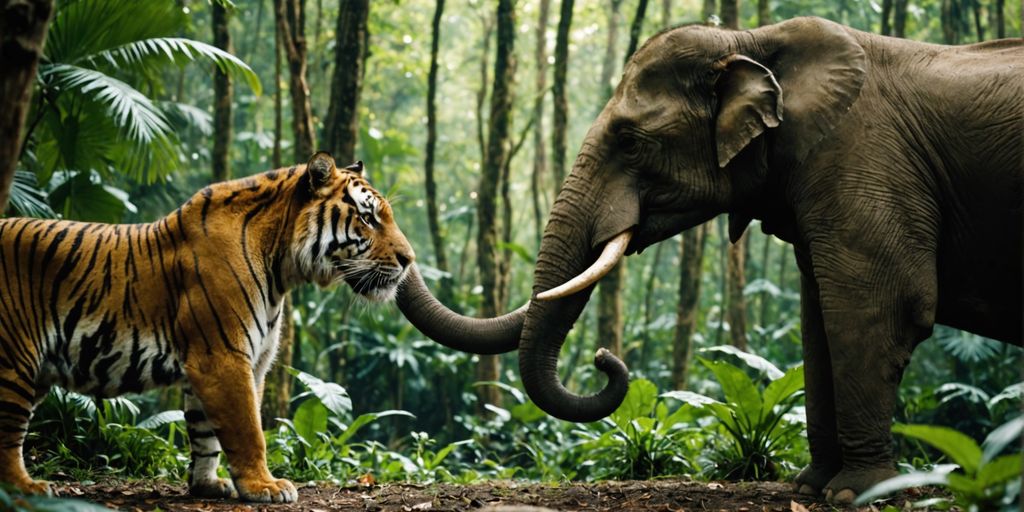Your Cart is Empty
🙏HELP US SAVE TIGERS!🐅 WE DONATE 1% OF OUR SALES TO WILDLIFE ORGANIZATIONS ( WWF ...)
Menu

🙏HELP US SAVE TIGERS!🐅 WE DONATE 1% OF OUR SALES TO WILDLIFE ORGANIZATIONS ( WWF ...)
Tiger vs Elephant: Who Reigns Supreme in the Animal Kingdom?
July 13, 2024 7 min read

In the wild, the tiger and the elephant are both incredible creatures, each with their own unique strengths. But what would happen if these two giants of the animal kingdom faced off? Would the tiger, known for its speed and power, stand a chance against the massive and strong elephant? Let's dive into this fascinating topic and see who truly reigns supreme.
Key Takeaways
- In most cases, a tiger would not be able to defeat an elephant due to the elephant's massive size and strength.
- Elephants have superior defensive abilities, making it hard for tigers to cause significant harm.
- Tigers and elephants usually avoid each other in the wild, with tigers often steering clear of elephants.
- While tigers are agile and powerful, elephants' sheer physical power gives them a significant advantage.
- There are rare instances where a tiger might target a young or weak elephant, but such cases are uncommon.
Would a Tiger Beat an Elephant? The Short Answer
Quick response: No, in most cases, a tiger would not beat an elephant
In most cases, a tiger would not beat an elephant. The sheer size and weight of an elephant, which can exceed 10,000 pounds and reach up to 12 feet in height, give it a significant advantage. While tigers are incredibly fast, reaching speeds of up to 40 mph, and have powerful bites with a force of 1,000 PSI, these strengths are usually not enough to overcome an elephant.
Elephants can easily shake off a tiger if it tries to leap onto their back. If the tiger gets caught under the elephant, it could be crushed or stabbed to death. However, there are rare instances where a tiger might win, such as when facing a baby or injured elephant.
Why Tigers Can't Usually Defeat Elephants
Size disparity
An elephant can weigh over 10,000 pounds, grow up to 12 feet tall, and reach 21 feet in length. In contrast, a tiger is much smaller, making it hard for the tiger to overpower such a massive animal. The sheer size difference alone gives elephants a significant advantage.
Strength difference
Elephants possess incredible strength, capable of knocking down trees and carrying heavy loads. Tigers, while strong and agile, simply can't match the raw power of an elephant. This strength allows elephants to fend off most predators, including tigers.
Defensive capabilities of elephants
Elephants have thick skin, strong tusks, and a powerful trunk, all of which serve as formidable defenses. Additionally, elephants often move in herds, providing extra protection against potential threats. Tigers, despite their speed and agility, find it challenging to penetrate these defenses and successfully attack an elephant.
Is a Tiger Afraid of Elephants?
Natural instincts and behavior
Tigers usually steer clear of adult elephants because of their huge size and strength. However, there are times when tigers might try to attack young or hurt elephants. Tigers use their speed and agility to aim for weak spots like the trunk or back legs. But elephants are very protective, and their herd behavior makes it hard for tigers to win in these situations.
Observed interactions in the wild
In the wild, tigers and elephants often cross paths, especially in places like the Himalayan Foothills and Terai forests. Tigers usually avoid direct fights with elephants. Instead, they might try to scare them off or look for easier prey. The protective nature of elephants and their tendency to stay in groups usually keeps them safe from tiger attacks.
Exceptions to the rule
There are rare cases where a tiger might successfully attack a young or weak elephant. These situations are not common and usually happen when the tiger is desperate or the elephant is alone. In most cases, elephants have the upper hand due to their size and group protection.
Comparing Strength: Tiger vs Elephant

Definition of strength in the animal kingdom
Strength in the animal kingdom isn't just about muscle. It includes size, power, and how well an animal can use its abilities to survive and dominate.
Physical power of elephants
Elephants are massive. They can weigh over 10,000 pounds and grow up to 12 feet tall. Their sheer size gives them a huge advantage. They can knock down trees and carry heavy loads with ease.
Agility and power of tigers
Tigers, on the other hand, are much smaller but incredibly powerful for their size. They can run at speeds of up to 40 mph and have a bite force of 1,000 PSI. Their agility and speed make them fierce hunters.
Why raw strength isn't everything
While elephants have more raw strength, tigers have speed and agility. In the wild, these traits are just as important. A tiger's ability to move quickly and strike with precision can be a game-changer. So, strength isn't just about being big; it's about how you use what you have.
Can a Tiger Kill an Elephant?

Rare circumstances where it might be possible
In the world of zoology, it's rare but not impossible for a tiger to kill an elephant. Tigers usually avoid adult elephants because of their massive size and strength. However, there have been instances where tigers have targeted young or weak elephants. These rare events usually happen when the tiger is desperate for food or sees an opportunity to attack a vulnerable elephant.
Young or weak elephants as potential targets
Tigers are more likely to attack baby or juvenile elephants. These young elephants are smaller and less capable of defending themselves. Tigers use their speed and agility to target sensitive areas like the trunk or hindquarters. Despite this, the protective nature of elephant herds often makes it difficult for tigers to succeed.
Historical accounts or anecdotes
There are a few historical accounts and anecdotes of tigers attacking elephants. In the forests of the Himalayan Foothills and Terai, as well as in North-Eastern India, tigers have been observed attempting to take down young or injured elephants. These stories highlight the rare but possible nature of such encounters.
Expert opinions on the possibility
Experts in zoology and big cats generally agree that while it's possible for a tiger to kill an elephant, it's highly unlikely. The size and strength disparity between the two animals make such encounters rare. Most experts believe that tigers would only attempt such an attack under extreme circumstances, such as desperation for food or an unusually vulnerable elephant.
Factors That Could Influence a Tiger-Elephant Encounter
Environment and terrain
The setting of the encounter plays a huge role. In dense jungles, tigers might have the upper hand due to their agility. However, in open areas, elephants can use their size and strength to their advantage. The habitat can tip the scales in favor of one animal over the other.
Age and health of both animals
A young or sick elephant is more vulnerable to a tiger attack. On the other hand, an old or injured tiger might not pose much of a threat to a healthy adult elephant. The age and health of both animals are crucial factors in determining the outcome of their encounter.
Presence of a herd (for elephants)
Elephants are social animals and often move in herds. A lone tiger would find it extremely difficult to take on a group of elephants. The protective nature of the herd can deter a tiger from attacking.
Desperation or unusual circumstances
In rare cases, desperation can drive a tiger to attack an elephant. This might happen if the tiger is starving or if its usual prey is scarce. Unusual circumstances like these can lead to unexpected encounters between these two giants of the jungle.
Animals That Can Potentially Defeat an Elephant
Other elephants

In battles of sheer strength, other elephants are the most likely contenders to defeat an elephant. These clashes often occur over territory, mates, or dominance within a herd. The size and power of another elephant make it a formidable opponent.
Humans (with weapons)
Humans, equipped with weapons, have historically posed a significant threat to elephants. Poaching for ivory has led to the decline of these majestic creatures. Despite their size and strength, elephants are vulnerable to human tactics and technology.
Large groups of predators (rare cases)
While rare, large groups of predators can sometimes take down an elephant. This usually involves a coordinated attack by a pack of lions or hyenas targeting a young, sick, or isolated elephant. Such events are uncommon but highlight the harsh realities of the predator-prey relationship in the wild.
Conclusion

Recap of why elephants generally have the advantage
In the battle of tiger versus elephant, the elephant usually comes out on top. Their massive size and incredible strength make them formidable opponents. Tigers, while powerful and agile, simply can't match the sheer bulk and defensive capabilities of an elephant.
The unique strengths of both animals
Both tigers and elephants have unique strengths that make them fascinating creatures. Tigers are known for their agility, speed, and powerful jaws. Elephants, on the other hand, have their impressive size, strength, and the use of their trunk as a versatile tool. Each animal plays a crucial role in their respective ecosystems.
Call to appreciate and protect both species
It's important to appreciate and protect both tigers and elephants. Conservation efforts are essential to ensure these magnificent animals continue to thrive in the wild. By understanding their roles in the ecosystem, we can better appreciate their unique qualities and the balance they bring to nature.
Conclusion
In the grand scheme of the animal kingdom, elephants generally hold the upper hand over tigers. Their massive size, incredible strength, and defensive abilities make them formidable opponents. However, this doesn't mean tigers aren't impressive in their own right. Tigers are agile, powerful, and have their own unique strengths. Both animals play crucial roles in their ecosystems, and it's important to appreciate and protect them. By understanding their behaviors and interactions, we can better respect the balance of nature and the amazing creatures that inhabit our world.
Frequently Asked Questions
Can a tiger defeat an elephant in a fight?
No, in most cases, a tiger cannot defeat an elephant. The size and strength differences are too significant.
Are tigers afraid of elephants?
Tigers generally avoid elephants due to their size and strength, but this doesn't mean they are necessarily afraid. It's more about survival instincts.
Have there been any instances where a tiger killed an elephant?
There are rare instances where tigers have targeted young or weak elephants, but it's not common. Most adult elephants are too strong for tigers.
Why are elephants so hard for tigers to defeat?
Elephants are much larger and stronger than tigers. They also have thick skin and strong defensive behaviors that make it difficult for tigers to harm them.
What animals can potentially defeat an elephant?
Other elephants, humans with weapons, and occasionally large groups of predators can defeat an elephant, though these situations are rare.
Why is the elephant considered the top animal in the animal kingdom?
Elephants are the largest land animals, with incredible strength, intelligence, and social behaviors. These traits make them dominant in their habitats.
Also in Tiger Blog

Sloth Bear vs Tiger: Who Would Win?
July 13, 2024 7 min read
Explore the thrilling showdown between a sloth bear and a tiger, analyzing their strengths, behaviors, and survival tactics.
Read More
Epic Battle: Polar Bear vs Tiger, who win?
July 11, 2024 8 min read
Epic showdown: Polar Bear vs Tiger. Discover who would win in this thrilling battle of nature's fiercest predators.
Read More
The Best Hand to Wear Tiger Eye Bracelet for Female
June 26, 2024 4 min read
Discover the best hand for women to wear a Tiger Eye bracelet and how to style, care, and gift it.
Read More